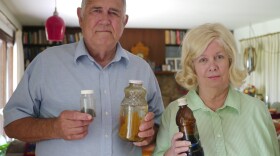At a public forum in Azle Wednesday night, KERA, StateImpact Texas and a panel of experts gathered to talk about what's behind the North Texas earthquake swarm.
Since late last year, nearly three dozen earthquakes have rocked the Azle-Reno area northwest of Fort Worth. And although the quakes are considered relatively small, they’ve been large enough to cause damage and raise alarm.
Both the mayors of Reno and Azle believe there is a link to the disposal wells from oil and gas drilling in the area.
“Common sense tells me if you take millions of gallons of water and pump it down into a fault bed, you can’t expect anything else. Common sense tells you it's going to shuffle and move things around. That fluid has to go somewhere,” said Mayor Linda Stokes of Reno.
Stokes says people in her city want the wells shut down. That won’t happen until more research is done. SMU seismologist Heather DeShon is among the experts gathering data from 12 stations that measure earthquake activity.
Wednesday night, DeShon announced that her research shows the quakes generate as deep as five miles below the surface.
“We know where the earthquakes are occurring and we know what sense of displacement takes place along faults,” she said. “We’re now working on trying to understand if there is a link between oil and gas industry activities and these earthquakes."
Both scientists and oil industry representatives agree the process will not be quick. Bill Stevens is a government relations consultant for the Texas Alliance of Energy Producers.
“It’s going to be a year, maybe two years before we have those answers,” he said.
But many residents here have already made up their minds.
John Hamilton, who lives in Azle, wishes there were a moratorium on all drilling activity.
“A lot of rhetoric, a lot of bureaucracy, government inaction,” he said. “It just takes a long time for anything to happen. The wheels just move slowly.”
Kathy Lingle, who lives in Azle, says she was still left wondering who will pay for damage earthquakes have caused to homes.
It may feel like the Texas Railroad Commission and Congress are moving slow, but Stokes says momentum is building.
“This is actually moved through in my experience with city government and now state government; this has moved faster than anything I’ve seen,” Stokes said. “And it’s moving because you’re talking.”
Listen to the June 18 earthquake forum
More from StateImpact Texas
Listen to Our Community Forum: What’s Behind the North Texas Quakes?
Finding Definitive Answers to North Texas Quakes Could Take Years, But Clues Appear
Other media coverage of the earthquake forum
Azle, Reno Residents Get Answers About Earthquakes KXAS-TV (Channel 5)
Mystery Surrounding Azle Earthquakes Still Frustrates Residents WFAA-TV (Channel 8)
Scientific Answer To Quakes In Azle Area A Year Off, Researcher Says (Fort Worth Star-Telegram)
KERA's earthquake series
Over the past week, KERA has been airing stories about the North Texas earthquakes.
- The Digger: Reno Mom Helps Neighbors Find Answers About Texas Earthquakes
- The Seismologist: SMU's Heather DeShon Studies The Shaking In Azle And Reno
- A Rocket Scientist And His Wife Blame Disposal Wells For North Texas Quakes
- Company Man: Oil and Gas Energy Rep Says Industry Understands Quake Concerns
- This Azle Couple Worries About Another Round Of Earthquakes
- Earthquake Swarm In North Texas 'Needs To Be Solved Right Now,' Azle Mayor Says
Earthquake coverage
For several months, KERA and StateImpact reporters have covered the earthquake swarm. Here are examples of recent stories.







